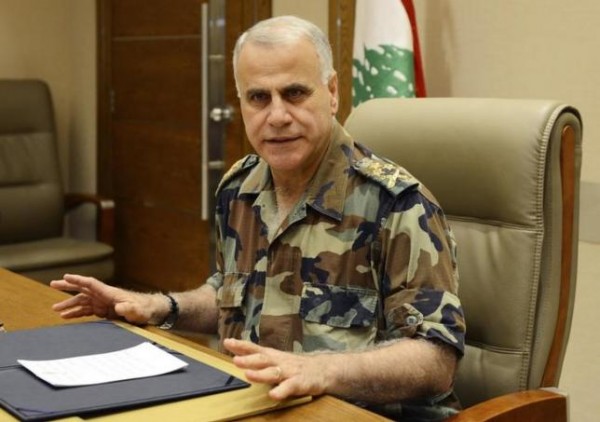
The Lebanese army commander says camps that are home to refugees from neighboring Syria represent a growing security risk as potential hideouts for militants who have been prevented from using other areas to launch attacks and rig car bombs.
General Jean Kahwaji told Reuters the security situation was otherwise broadly under control two weeks after Islamic State suicide bombers killed 44 people in the southern suburbs of Beirut in the bloodiest example yet of spillover from the Syria war.
More than one million refugees from Syria are in Lebanon living in camps in the eastern Bekaa Valley, in Beirut, in northern Lebanon and in the south. They account for about a quarter of the country’s population now.
The country has been repeatedly jolted by security incidents linked to the war in Syria, where the Lebanese Shi’ite group Hezbollah is fighting alongside the Syrian army against insurgent groups including Sunni Islamists.
“There may be breaches – Borj al-Barajneh was a breach, and there may be another breach – but in general there are no longer uncontrolled places where car bombs can be rigged,” Kahwaji said. Borj al-Barajneh – the site of the Nov. 12 attack – is in the southern suburbs of Beirut that are controlled by Hezbollah.
The security forces say a wave of arrests since the attack has rounded up most of the network behind it.
A military court on Wednesday charged 26 people with membership of Islamic State, 23 of whom it said were responsible for the Borj al-Barajneh attack, which was carried out by suicide bombers using explosive belts.
“We had great success in preventing car bombs, so they went in the direction of small cells and explosive belts. They could make use of people from within a camp to help them,” said Kahwaji, speaking at his office at the defense ministry headquarters in the mountains east of Beirut.
The United Nations refugee agency, UNHCR, says there are more than 3,000 Syrian refugee camps in Lebanon.
With the onset of the Syria war, the government resisted the establishment of organized refugee camps on its soil, fearing a repeat of the experience with Palestinians still living in refugee camps more than 60 years since the creation of Israel.
Some Palestinian camps in Lebanon have over the years become bases for armed groups and are not under government control.
“The camps need to be organized,” said Kahwaji, while acknowledging the political divisions that have arisen over the issue, with the word “camp” now sounding alarm bells among Lebanese.
DANGER FROM CAMPS
“We raid, and we look for weapons in the camps, but we don’t know the people and this is what makes the danger from them great. Yes, the refugee camps cause us a headache because they are not controlled,” he said.
“They must be under the authority of the state and be open, and when the state wants to enter … they must be cooperative. We are not against people. We welcomed them and I have a humanitarian conviction that they must be helped and (allowed) to live, but not to affect our security,” he said.
“We deal with them on the basis that they are human beings … but it is possible that danger could come to us from them.”
One measure he mentioned was a requirement for camps to be positioned at least 500 meters (yards) from main roads, which would prevent gunmen using them to fire at passing vehicles.
The Lebanese army is widely seen as the backbone of the state pieced back together from the 1975-90 civil war.
It plays a major role in internal security as well as security at the borders. The army recruits carefully from across Lebanon’s sectarian spectrum, and is the most trusted security agency in the country.
Kahwaji, 59, assumed command of the army when his predecessor, Michel Suleiman, became president in 2008.
A Maronite Christian, Kahwaji is seen as a possible candidate to fill the presidency left vacant since Suleiman’s term expired in May, 2014 with no agreement among rival politicians on a successor.
The army has fought protracted battles with militants on Lebanese territory since the onset of the Syria crisis. Last year it repelled an incursion by militants from Islamic State and the al Qaeda-linked Nusra Front into the border town of Arsal in northeastern Lebanon.
“Our situation on the borders is excellent. In Arsal, and Ras Baalbek, the deployment is excellent. They do not scare us and we will not allow them to move. When we feel any movement, we open fire on them with artillery and aircraft.”
Reuters exclusive report
This is to remind all our readers to respect the community . Comments that contain personal attacks or inappropriate language will be removed.
For those who are new to this site please note that Ya Libnan is all about fixing Lebanon.
We want our readers to come up with ideas that if implemented will make lebanon a better country.
Ya Libnan is a democratic venue that is open to anyone wishing to contribute any ideas to improve Lebanon. Our only wish is to maintain the civility of the discussions and that is why those who have not been able to abide by this rule have been banned from participating in this forum . We don’t want or expect anything from anyone …better lebanon is the only reward we seek. Help us get there!

Leave a Reply
You must be logged in to post a comment.